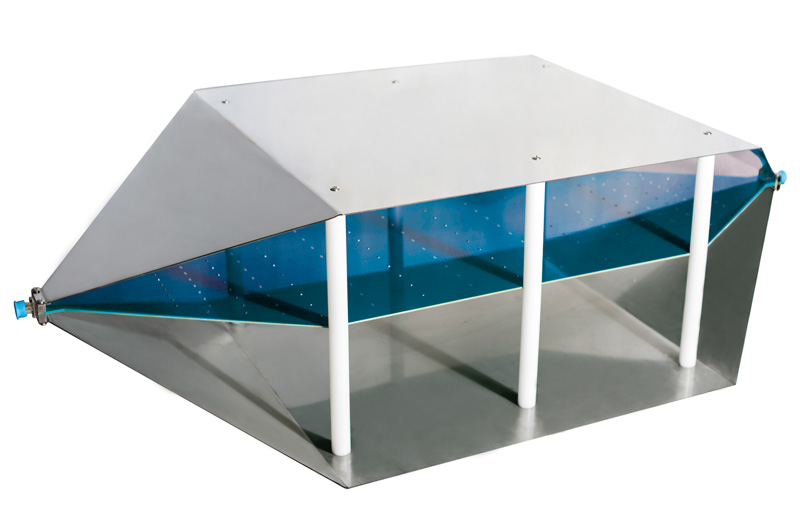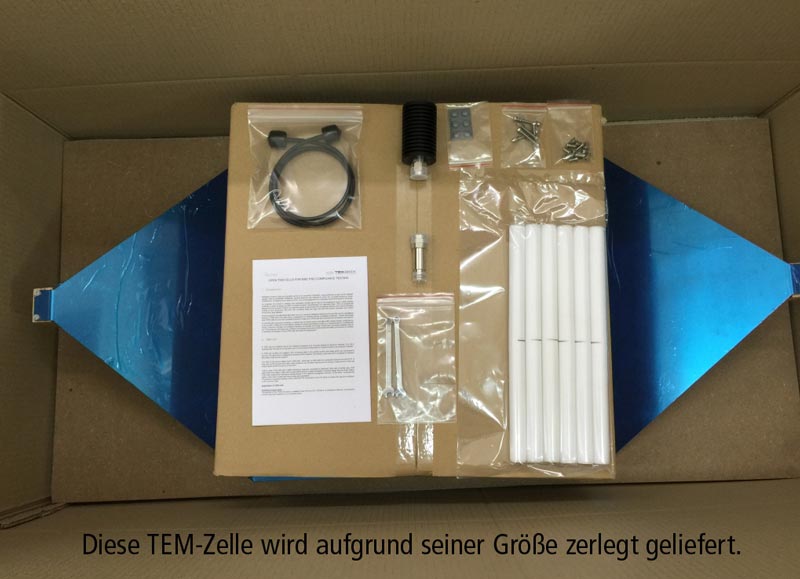Tekbox TBTC2 / TEM-cell large
TEM cell for simple and cost-effective measurement of radiation and strength
Why a TEM cell?
A TEM cell (Transverse ElectroMagnetic Cell) is used to record test objects for measuring and testing the radiation or immunity of electronic devices. Usually, the radiation is measured in anechoic environments and the signals are picked up by antennas. Due to bandwidth limitations, different antennas are required to cover the entire frequency range. Furthermore, a lot of space is needed and the cost of equipment for a standard compliant setup is enormous.
Nötig is an affordable laboratory setup for measuring radiation in your own laboratory before acceptance in the EMC test house. The handy TEM cells from Tekbox cover the entire frequency range up to 2 GHz and are also suitable for frequencies beyond that. In combination with a spectrum analyzer, products can be tested before and after EMC-relevant modifications. The test setup with a TEM cell provides valuable information on whether the design has rough edges with regard to radiated noise signals. The engineer can clearly see whether his changes have worsened or improved the EMC behaviour.
Benefits of the TEM cell from Tekbox:
The TBTC3 is a so-called “open TEM cell“ because it has no side walls to facilitate the placement of the DUT (Device-Under-Test). External radiation can penetrate the cell, but can be easily identified by measuring the output signal of the cell when the DUT is switched off and can thus be taken into account in the measurement result. A TEM cell consists of a septum, the conductive plane in the middle and outer walls connected to ground. The geometry is dimensioned to give an impedance of 50 Ω. The DUT is placed between the lower wall (floor) and the septum.
The TBTC3 from Tekbox offers a better frequency response than standard TEM cells of the same size. TEM cells suffer from unexpected vibration modes at higher frequencies, which limit the usable bandwidth. An outstanding design feature of Tekbox TEM cells is the implementation of a resistance perpendicular to the wave propagation direction. Higher order modes and resonances are effectively suppressed. The TEM cell is supplied with a 50Ω/25W RF terminator and a DC blocker to protect the input of the spectrum analyzer or RF receiver.



Technical data:
TEM cell TBTC3
- Dimensions (L x W x H): 1038 x 501 x 305 mm
- Rectangular area under the septum: 360 x 480 mm
- Septum height: 150 mm
- Maximum volume of the test piece (L x W x H): 300 x 300 x 100 mm
- Connectors TEM cell: N-sockets
- Nominal cell impedance: 50 Ω
- wave impedance: 377 Ω
- Maximum RF input power: 25 W
- insertion* S21: up to 730 MHz: < 3 dB
DC blocker 50V-6GHz-N
- Connections: N-plug/socket
- Nominal impedance: 50 Ω
- Max. HF continuous power: 25 W (limited by the load capacity of the supplied 50 Ω terminating resistor)
- Max. HF continuous voltage: 50 VRMS
- Frequency: 500 kHz to 6 GHz
- Standing wave ratio: ≤1,2
Introduction DC blocker:
|
Frequency [MHz] |
0.3 |
0.7 |
1 |
10 |
100 |
1000 |
3000 |
|
Insertion [dB] |
7.5 |
3 |
1.5 |
0.02 |
0.02 |
0.06 |
0.2 |
HF terminating resistor 50Ω-3GHz-25W-N
- connection: N-plug
- Nominal impedance: 50 Ω
- Max. HF continuous power: 25 W
- Frequency: DC up to 3 GHz
- standing wave ratio: ≤1,2
- 3rd order intermodulation product : ≤120 dBc
Incl.: DC blocker (N plug/socket), HF terminating resistor (N plug), coaxial cable N plug to N plug (1 m).
* Each TEM cell comes with a measurement protocol (plot) for flow S11 and insertion S21.
Login




